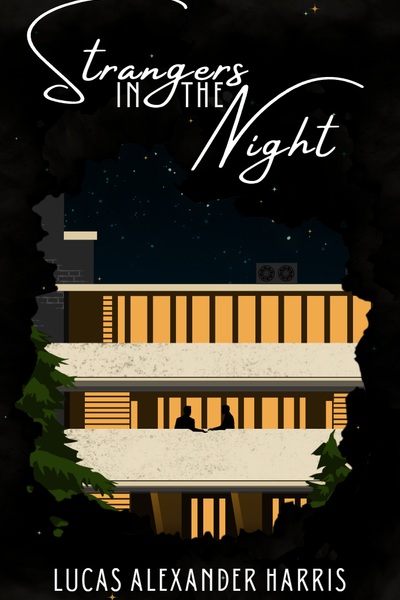Ian sucked down the last bitter bite of the salad as the waiter took the plate away, his tongue only tasting the balsamic vinaigrette. Polite conversation floated overhead, superfluous and light and empty and boring. “I like living in Boston,” he said once he had swallowed, and the involuntary shiver crawled up his spine. “It’s one of those places where you can live for years and find something new every time.” He smiled.
“Have you ever been to Paris? It’s that same kind of feeling,” one of his tablemates said. Their face was flat, all expression channeled into their eyes.
It unnerved Ian intensely, leaving him teetering on a thin line between discomfort and ease. “No. I’ve been dying to go, though. There’s Prague, Barcelona. Budapest. Stockholm. Venice was beautiful, but I wouldn’t go again. Too crowded. I would go back to Amsterdam in a heartbeat, though.”
“Don’t do Venice. It’s so ‘over it’. I don’t know the word.”
“Go to Amsterdam in the spring. They have the tulip festival, and it’s absolutely gorgeous.”
“Noted. Thanks,” Ian smirked, though the expression felt too thin, too forced for his liking. He covered it up by wiping his forehead. His hands shook. “I actually got to study abroad in Rome for the summer. Bopped around Europe after that, but not enough. But oh my God, Rome is gorgeous.”
“What do you do for a living, Mr. Randolph?” someone asked.
Ian turned, yet could not distinguish who asked the question. Three sets of eyes were on him, their stares hard and analyzing. He shifted in his chair. “I’m a market research analyst, which –”
“So am I,” another guest laughed. The woman on the other end of the table leaned forward. “Where do you work? We might’ve crossed paths before.”
“You wouldn’t have heard of it. We’re an architecture firm based in Fenway. Outside of Boston. Obviously. Sorry. We mostly do new builds and remodeling work, but we have done some pretty good renovations recently.”
“Anything we would’ve heard about? I read Architectural Digest every so often.”
Ian smiled, drawing in air to speak, but the image of those ten awful gray and brown townhouses stopped him. He bared his teeth. “My firm did the...townhomes. In Weston?”
“Ooo,” someone cooed.
“I thought those were gorgeous.”
“A bit too...blah for my tastes.”
Ian perked at that.
“Neutral tones, that’s where it’s at.”
His heart sank. Ian sank back in his seat a little.
The three gorgeous Colonial homes were medieval clocks, masterfully designed and built to such a degree that rebuilding them would’ve been impossible. The houses had souls. They were proportioned, beautiful and elegant ladies, and the townhouses that replaced them were an antithesis to the rest of the neighborhood, like slapping a 60-story skyscraper in the middle of a medieval neighborhood. A patch of dead grass on an otherwise green lawn. There was public outcry the moment his company started knocking them down. Everyone in Weston didn’t want them built. Even after they were built, everyone wanted them gone. “Architectural eyesores.” “Destroyers of history.”
What’s worse was that Ian designed the townhouses, adhering to the area’s classical design principles and architectural cues. He sat in on the client meetings and tried to get them to match the neighborhood architecture. He did footwork with the local community and preservation society, vague as his questions were. Work well above and outside his pay grade, yet if someone asked, he did it.
He could have changed the finalized plans. His heart sank when he saw the final renders. He could’ve spoken up.
But the looks. Everyone was so pleased with them. They toasted their success. Coworkers patted his back, thanked him for the hard work, and took his credit.
His misgivings were drowned out when his boss patted him on the shoulder and said, “Thanks for the help, Ian. You’re really a team player like that.”
A small part of him went with the rubble of those gorgeous Colonial homes. He would never forgive himself after that.
“Is that what you went to school for?”
“Yeah,” he breathed, trying to recollect himself. His eyes started scanning the room. “Not...not market research. Specifically, I studied architectural design and urban planning. I also took basic psychology classes to understand how people should feel when they enter a building, residential or otherwise.”
“How interesting,” someone said.
“I believe buildings can be beautiful, relate to an area, and not, just...blah, for lack of a better word,” Ian laughed. “My senior thesis was on the growing importance of vernacular architecture in a modern age, to explore the idea of architecture in a changing environment.” Even if it was said with such genuine earnestness, it brought the conversation to a standstill.
By the looks on everyone’s faces, no one knew how to respond.
Ian resigned, guilt eating his stomach. “Ah, sorry,” he chuckled. “I forget people don’t know what I’m talking about half the time.”
“No worries,” another guest smiled, their lips gentle and apologetic. “I tend to be like that when I talk about the Nets.”
Someone turned to them. “Did you see their game against the Celtics?”
“I’m not talking about that game with you or anyone,” they laughed. Their breath picked up the conversation and moved on, leaving Ian alone at the circular table.
Ian tried to insert himself where he could, bits and pieces of something he recognized floating through his ears, though often ended up only sprinkling in an “Oh?” s and a few “Mm” ’s here and there, for clarification to further the conversation. He hoped the effort would be reciprocated in some way on his end – they would ask more about his job, his hobbies, his life in Boston – which did not happen. Ian felt himself drifting away despite the urge to stay put. Rage built in his stomach. His eyes started scanning the room again, the pit in his gut growing more and more twisted.














Comments (6)
See all